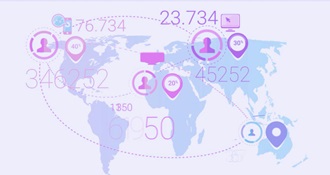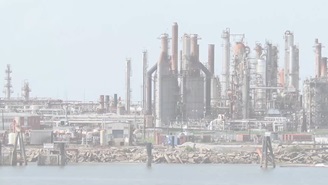Plastics - A Material Issue for Investors
The plastic waste issue is currently one of the fastest growing environmental topics on the political and business agenda. Plastic is a vital product to the global economy; however, the way it is being produced and managed is unsustainable, especially at the use and after‐use phases. The carbon footprint and emissions associated with plastic production along with the issue of the environmental and potential health impacts of plastic waste are a matter of growing concern for investors. In light of the environmental, social and financial challenges, the linear “take, make and dispose” approach cannot continue. The alternative is a circular economy approach, which focuses on maximizing resource value, making resource use more efficient and extending product value during use.
South Africa and ESG Risk
A Case Study On November 1, 2019 Moody’s cut its rating outlook for South Africa from “Baa3 stable” to “Baa3 negative,” putting the country’s bonds on the cusp of junk status after several harbingers of a potential downgrade.[i] Earlier this year, the World Bank and the International Monetary Fund cut their 2019 growth forecasts for South Africa to around 0.8%, while the Institute of International Finance warned that the country’s public debt could grow to 95% of Gross Domestic Product (GDP) by 2024.[ii] The other two big credit rating agencies (CRAs) – Fitch and S&P – downgraded South Africa’s credit rating to sub-investment grade back in 2017, citing a deterioration in the country’s public finances.[iii]
A Case for Impact Investing in Public Equities
As awareness around environmental and social issues has grown, so has the number of investors who deliberately seek to allocate capital to create positive social and environmental impact. Impact investing is as old as the sustainable investment industry, with the bulk of strategies to date having been executed through private equity and debt vehicles. However, as a more diversified pool of investors look to adopt impact investing strategies, fueled by the United Nations’ Sustainable Development Goals (SDGs) and the Paris Climate Agreement, a broader set of asset classes are being considered – here enters public equities.
Sustainable Finance and the EU Taxonomy: Developments from the Trilateral Negotiations
As global leaders meet in Madrid for the COP25 amid mounting concern over the international response to climate change, the EU Taxonomy experienced a setback with the UK and France blocking the plans. The new framework, intended to drive financial flows that will accelerate the shift to a low carbon future, will likely become a global standard affecting investors around the world. If enacted, it could cement the EU’s position as the world’s pace setter on climate legislation.
Death and Taxes are the Only Constants - But Not for Everyone
Major global companies such Google, Amazon, Facebook and Apple (known as “GAFA”) have come to dominate not just the tech industry but increasingly global commerce as well. The OECD estimates that companies like these avoid USD 100-240 billion in taxes annually, representing roughly 4-10% of global corporate income tax revenues. Attention paid to corporate taxation has also risen sharply in recent years, with increasingly heated debates on what constitutes “companies paying their fair share.”
PFAS Sparks a Wave of Litigation in the U.S. Chemical Industry
In 2019, a wave of litigation related to per- and polyfluoroalkyl substances (PFAS) emerged in the United States, as several states filed lawsuits against PFAS manufacturers, including DuPont, Chemours and 3M. This legal action accompanies increased regulatory scrutiny of this potentially risky class of chemicals. In this article, we will focus on the risks chemical companies face related to PFAS contamination of drinking water in the United States and the ESG risks posed to chemical companies and their investors.
Aligning Finance and Sustainability: The Role of the Principles for Responsible Banking
The Principles for Responsible Banking requires banks to take a hard look at their business strategies and their impacts on the environment and society. For this reason, Sustainalytics has endorsed the Principles for Responsible Banking and has committed to working closely with banks as they seek to further incorporate sustainability considerations throughout their operations.
Revising Mining Codes: Equality for Nations or Nationalization?
In recent years, an increasing number of nations, particularly in Africa, have been amending their mining codes. Governments likely view these amendments as a way of getting more for their people from their natural resources. But are these amendments slowly leading to the nationalization of the sector in some of these countries and how are the companies reacting?
Cybersecurity: A Pervasive Risk
In 2017, in the wake of the WannaCry ransomware attack, we argued that the event should be seen as a cybersecurity wake up call. Since then, cybersecurity risks have remained a source of uncertainty for most companies, driven by the increasing intensity, both in volume and impact, of cyberattacks. These risks are compounded by the continuous expansion of critical infrastructure (energy grids, utilities, hospitals) to digital platforms and the breadth of sensitive information that is housed in online servers. As a result, the pool of lucrative targets for malicious actors continues to grow. This is reflected in the notable rise in the number cyber insurance claims. According to a study by AIG, 2018 had the same number of cyber insurance claims as the preceding two years combined.[i]
Business Ethics and Economic Downturn - A Closer Look at China
In October 2019, China posted its lowest quarterly GDP growth rate (6.0%) in 30 years. While the country’s trade war with the US might have added to the economic headwind, the economic results are in line with a decade of cooling down following years of double-digital growth.
The Opioid Crisis and the Continued Uncertainty for Affected Companies
As the first National Prescription Opiates Multidistrict Litigation (MDL) cases are set to get underway in late October, we take a closer look company involvement in U.S. opioid crisis and how it has evolved since our first article on the topic in 2017. We also provide an overview of how the ESG risks highlighted in our initial article have materialized over the last two fiscal years (FY2018 and FY2019) for the companies involved.
Children’s Rights – the smallest things can have the biggest impact
Imagine there was a stakeholder group that formed a third of the global population and was pertinent to business in various ways: as customers, as employees’ family members, and as key participants in local communities and in society at large. These people would be guaranteed to run the world in the future. Almost everyone would know and be related to representatives of this network, and many would consider them the most important people in their lives. You would expect companies and investors to assess the impact they have on these powerful influencers and try to capitalise on the related opportunities, but that is rarely the case. This is because the group I’m talking about is children. When it comes to incorporating children’s rights and needs into business and investment strategies, there is still a long way to go given their number and potential.
The Impact of Country ESG Risks on Company Operations
In this article we explore how operating in Peru affects the world’s second largest mining producer of precious metals, Barrick Gold. Based on analysis from our recently launched Country Risk Ratings, we discuss how the challenges facing Barrick’s mining operations in Peru are strongly influenced by the country’s ESG risks.
Generali Green Bond Framework and Second-party opinion
Assicurazioni Generali SpA (“Generali” or the “Group”) is a global insurance and financial services company based in Italy. Founded in 1831, Generali now operates in over 60 countries with approximately 71,000 employees and is one of the world’s largest insurance providers by revenue. It is well positioned in the insurance business, and with its asset management business in Europe, with a growing presence in Asia and Latin America. In addition to Generali’s three strategic pillars – profitable growth, capital management and digital transformation – Generali established sustainability as a key initiative and one of its important goals for 2021 (Read more: https://www.generali.com/our-responsibilities).
Introduction to Sustainability-Linked Loans and ESG Ratings
Sustainable finance and green lending are on the rise as more borrowers and lenders recognize the potential benefits of green and sustainability-linked loan products for their businesses. According to the Loan Markets Association (LMA), sustainability linked loans are a "dynamic and innovative product that enables lenders to incentivize improvements in the borrower's sustainability profile.” Sustainability linked loans align the loan terms to the borrower's performance against pre-determined sustainability performance targets such as a company’s ESG rating. Learn more about ESG Ratings
Tax Transparency in Australia
As Benjamin Franklin once said, “in this world nothing can be said to be certain, except death and taxes.” He was referring to the world in 1789. In today’s world, death remains a certainty. Taxes on the other hand, are less certain as companies, accountants and lawyers have found ways to reduce tax obligations.
Brazil: Deforestation in the Global Context - Part 2
In our previous blog post, we detailed the impact that the new Brazilian government’s policies have had on deforestation and could have on Brazil’s Indigenous Peoples. In this second article, we will explore how material recent developments in Brazil could be for the companies, communities and financial institutions involved. We will also take a closer look at Brazilian meat processing company JBS SA (JBS) and the consequences it may face due to international concern over deforestation.
Emerging market equities, ESG risk and sector tilts
The International Monetary Fund’s (IMF’s) recent downward revision to its projections of near-term global expansion reflects growing concerns about brewing market tensions. Central issues affecting capital markets include trade disputes between the US and China, Brexit and subdued investment and demand for consumer durables. According to the IMF’s latest outlook, global real GDP will grow 3.2% in 2019 and 3.5% in 2020 – a downgrade of 10 basis points (bps) for each year compared to the IMF’s previous outlook last April.[i]
The fairy-tale of Faroese fish farming
Aquaculture is the fastest growing food production sector in the past 20 years. It will become vital in meeting the rapidly increasing demand for seafood, and is expected to provide 50 per cent of total seafood consumed in the coming years.[i] Contributing to an increased protein supply and global food security, aquaculture also carries many risks. These risks include the potential spread of diseases and parasites, use of antibiotics and pesticides, and the escape of fish from fish farms which can jeopardize wild populations.



















